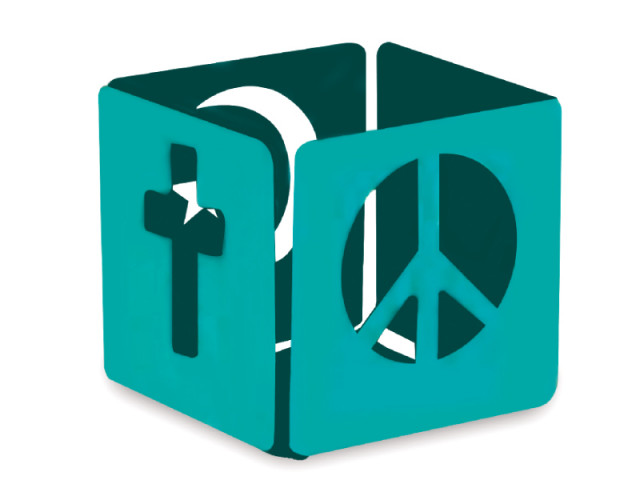Seminar: Speakers give their two cents on social, religious divide
Social activists, religious scholars call for efforts to curb rising intolerance at all levels in society.

There is no question of a functional secular system in Pakistan. Religion cannot be eliminated from the country’s social fabric, says Khurshid Nadeem. ILLUSTRATION: FAIZAAN DAWOOD
Prominent religious, moderate and secular scholars came together on Tuesday to discuss rising intolerance in society and offered their divergent views on exploring opportunities to achieve peace, stability and coexistence.
The speakers participated at a seminar on “Peace, Harmony and Coexistence: National and Religious Obligations,” organised by Pakistan Institute of Peace Studies (PIPS) at a local hotel.
The first session, on “Peace, Harmony and Coexistence: Religious and Socio-Cultural Context,” was moderated by journalist Zahid Hussain and focused on how religion is used as a tool for political interest and personal gain. Religious scholar and columnist Khurshid Nadeem, Naeemia University, Lahore Principal Dr Raghib Naeemi, rights activist Farzana Bari and analyst Mosharraf Zaidi were the session’s panellists.

Hussain underscored that tolerance was decreasing at all levels within society. Referring to religious intolerance, he highlighted the recent incidents of sectarian violence in Quetta, Bhakkar and Islamabad and pinpointed a divide of secularists versus Islamist groups in the country.
He observed that up until 1960, incidents of extremism were almost unheard of in the country.
Nadeem focused on the Islamist school of thought. “In this age of globalisation, no incident happens in isolation. The world is particularly sensitive about the issue of religious minorities,” he said.

The roots of present-day violence in the country can be traced back to the Iranian Revolution in 1979, he added. He dubbed the conflict between the Middle East and Iran a political issue which had implications in other countries including Pakistan. He dismissed the idea of a functional secular system, arguing that religion cannot be eliminated from the country’s social fabric.
Naeemi called for reforms to address religious violence. He held the media responsible for creating confusion and frustration among the general public.
Zaidi maintained that the secularists and Islamists were two very small classifications in the larger, global context. “There is no clear distinction between the two as we extract our value systems and concepts from religion and other worldly factors from state and society. I do not accept a world divided into Muslims and non-Muslims, Shia and Sunni, Islamists and secularists,” he said.
In a digital age of rapid information sharing through the media and on social networks, he pointed to a passive aggression where people were neglecting important social, political and cultural aspects.
Quoting a survey, Zaidi said 25 million children in the country were out of school but that there was a 100 per cent consensus across the board that each child must attend school.
He cited scenario between Islamists and secularists in Egypt that had spanned around three decades, and resulted in dire consequences.
Bari observed that the source of conflict was violence at all levels within society. She underlined contradictions within the constitution, which on one hand claim there is no discrimination on the basis of gender while on the other hand, contains the Hudood Ordinance. She dubbed the political system patriarchal and gender-based.
The second session on “Obstacles in the way to National Harmony and Mutual Dialogue” was moderated by writer and intellectual Ashfaq Saleem Mirza. The panellists comprised Jamiah Imdiadia, Faisalabad Vice-Principal Mufti Muhammad Zahid and Jamia Madinaul Alam Vice- Principal Syed Muhammad Najfi.
Mirza maintained that the poor economy was the root cause of the problem. “If we equate economic disparity with cultural diversity, there is a problem,” he said.
He touched upon sectarian differences before social and economic developments took place in first-world countries where industrial revolutions were major game changers.
The speakers agreed that divisions exist in nearly all schools of thought, whether in secular, Islamist or overlapping systems. Beyond the scope of discourse and rhetoric, they underscored the need for the government to exercise political will to change the status quo.
Published in The Express Tribune, August 28th, 2013.



1725254039-0/Untitled-design-(24)1725254039-0-208x130.webp)















COMMENTS
Comments are moderated and generally will be posted if they are on-topic and not abusive.
For more information, please see our Comments FAQ